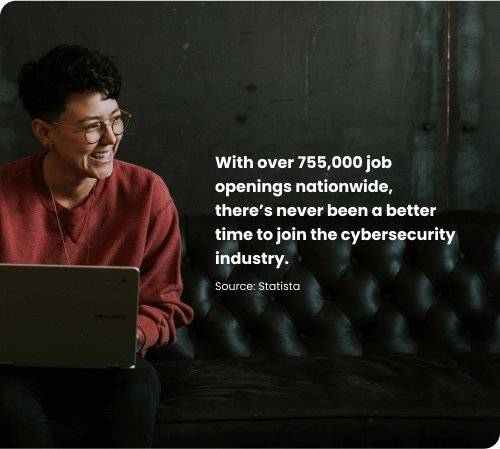NJIT Cybersecurity Professional Bootcamp
Accelerated Classes | Career Prep | In-Depth Training


Change Your Career.
Change Your Life.
Learn From Industry-Leading Instructors
The Cybersecurity Professional Bootcamp is designed to kickstart your cybersecurity career, no matter your current level of tech knowledge. In less than a year, you’ll go from beginner to job-ready professional with the comprehensive training needed for a career change.
We start with cybersecurity fundamentals and guide you through progressively more advanced tasks, preparing you for real-world challenges you’ll experience on the job.
Join the Field of Cybersecurity With Job-Ready Skills
Learn the skills you need to defend against cyber threats and hackers. Our curriculum covers everything from cybersecurity basics to more advanced, in-demand skills, including the latest AI advancements.

Become a Cyber Defender With Hands-On Training
Hands-On Classes
Engage in practical exercises and simulations to develop the job-ready skills needed to succeed in the cybersecurity field.
Virtual Classroom
Study remotely with part-time, weekday classes, and collaborate with instructors and peers through our interactive virtual tools.
Expert Instructors
Learn from experienced cybersecurity professionals dedicated to your success.
TDX Arena
Test your skills in real-world cyberattack simulations through the immersive TDX Arena, a gamified virtual platform.
Personalized Support Every Step of the Way
Professional Network
We host virtual career fairs, industry panels, mock interview days, skill-building webinars, and more.
Career Coaching
This program comes with a built-in team of Career Coaches committed to getting you ready for job opportunities. Need resume help? They’ve got it covered. Want to practice interview questions? They’re here for you. Plus, so much more to help you achieve your dream career.
Learner Support
Our dedicated team is here to help you thrive throughout the program and beyond. From facilitating exam retests and tutoring sessions to keeping you accountable, they are an essential and valuable resource for all learners.
Job Search Assistance
Finding the right opportunities is not always easy. Our team can connect you to help get your foot in the door for the cybersecurity roles you want. They are ready to help you launch your new career in this skyrocketing field.

Discover Everything You’ll Learn
Read the course catalog.
Program Overview
32-Week Cybersecurity Professional Bootcamp
- Fundamentals Phase12 Weeks
The Fundamentals Phase covers essential cybersecurity principles, including network basics and their functions, Microsoft’s infrastructure, and Linux operating system management. You’ll leave this phase with a solid foundation to help you advance in the world of cybersecurity.
- Computer Networking Fundamentals
This course delivers a thorough introduction to computer networking, equipping learners with practical skills in configuring and managing network devices to ensure optimal performance and security. Participants will develop an understanding of network architectures, protocols and security measures while sharpening their abilities in device configuration and troubleshooting. Through hands-on activities, they will apply critical thinking and problem-solving skills to tackle typical networking issues.
Learners will:
- Acquire knowledge about the connections and interactions of different entities in digital landscapes.
- Develop an understanding of various network types and their impact on our interconnected world.
- Utilize the benefits of configuration settings documentation.
- Explore the role of audits in ensuring optimal network performance and security.
- Recognize the importance of system and communications protection in safeguarding information.
- Learn effective strategies for updating and adapting policies to keep up with the ever-evolving landscape.
The course content also serves as a foundation for studying for the following certifications:* CompTIA® Network+, ISC2 Certified in Cybersecurity℠
- Microsoft Security Systems Administration
This course provides hands-on training that focuses on securing Microsoft Windows environments, equipping learners with practical knowledge and skills to effectively implement security features and tools such as Microsoft Defender, BitLocker and Windows Firewall. Additionally, participants will learn how to configure and manage networks using system admin tools to ensure security and stability. By the course’s conclusion, learners will have a comprehensive understanding of the fundamentals of Microsoft infrastructure and will be proficient in implementing and maintaining secure Windows environments across diverse professional roles.
Learners will:
- Acquire knowledge about Microsoft infrastructure and its components.
- Learn effective strategies to safeguard Microsoft infrastructure against potential threats.
- Develop skills to manage different types of accounts based on business functions.
- Explore methods to maintain a secure and safe network environment.
- Discover how automation and scripting can enhance security and efficiency in cybersecurity roles.
- Understand the role of Active Directory in managing permissions and controlling access to network resources.
- Learn techniques to enhance system security and operational efficiencies using PowerShell.
- Integrating Your Infrastructure Security
This course empowers learners with the essential skills to manage Linux operating systems, apply basic Python programming, delve into cloud computing and bolster system security against various threats and vulnerabilities. Participants will also acquire the skill set to monitor, scan and analyze threats and vulnerabilities in these environments, becoming well-versed in remediation techniques. Lastly, learners will gain insight into the influence of DevSecOps on the cybersecurity landscape.
Learners will:
- Acquire knowledge of managing Linux operating systems and effectively monitoring, scanning, and analyzing threats and vulnerabilities in Linux and cloud-based environments.
- Receive an introduction to Python programming.
- Develop a fundamental understanding of cloud computing environments, including creating an instance using Amazon Web Services (AWS).
- Learn how to remediate and share details to safeguard other systems.
- Learn how to create automations to efficiently manage and protect systems.
- Explore the design principles of scalable cloud solutions and the integration of diverse environments.
- Familiarize themselves with DevSecOps.
The information covered in this course serves as a foundation for learners preparing to study for the AWS Cloud Practitioner certification.*
- Infrastructure Phase12 Weeks
The Infrastructure Phase provides you with the knowledge and hands-on experience to create and sustain secure infrastructures and technologies. You’ll gain practical skills in applying critical security measures, as well as an understanding of a hacker’s perspective, to safeguard organizational systems.
- Securing Your Network
In this course, you will further enhance your knowledge of networks and deepen your understanding of their intricacies. As you delve into the world of networks, you will become acquainted with the various elements of both wired and wireless networks, including their unique security limitations and vulnerabilities. Building upon this foundation, you will develop access controls that encompass all aspects of network security, from individuals and data to devices. Overall, the course will cover the safe construction and fortification of networks, including discussions on cryptography and privacy considerations.
Learners will:
- Acquire knowledge of network security measures, including the essential strategies for maintaining network safety.
- Master network monitoring techniques to ensure effective oversight.
- Develop proficiency in managing accounts within a system.
- Explore the ways in which security attributes can reinforce network defenses.
- Familiarize yourself with a variety of common tools and technologies that support network safety.
- Develop the skills to construct a secure network architecture.
- Learn the fundamentals of MHN networks and effective setup methods.
- Understand the relationship between Telnet and POP3 machines.
The course content also serves as a foundation for studying for the following certifications:* CompTIA® Network+, Cisco Certified CyberOps Associate
- Designing Your Cybersecurity Infrastructure
This course extensively covers the crucial elements of securing endpoint devices, implementing data loss prevention techniques and utilizing advanced tools and strategies to safeguard an organization’s digital assets. Upon completion of the course, participants will understand endpoint device protection, data loss prevention and the security considerations relevant to industrial systems and IoT devices.
Learners will:
- Explore endpoint devices to gain knowledge on evaluating, identifying threats and implementing protection measures.
- Learn effective documentation and tracking of configurations and tool options.
- Understand the establishment of rules and restrictions for safeguarding endpoint devices.
- Discover methods of working with external information systems while ensuring endpoint device security.
- Develop skills in implementing data loss prevention techniques.
- Acquire familiarity with threats and security measures pertaining to Industrial Control Systems (ICS) and Industrial Internet of Things (IIOT).
The information covered in this course helps learners prepare for the following certifications:* CompTIA® Security+, CompTIA® CySA+, ISC2 CISSP.
- Social Engineering and Ethical Hacking
In the Social Engineering and Ethical Hacking course, participants delve into the mindset of hackers and gain insight into game theory principles in relation to cybersecurity defense and solutions. By course completion, learners will grasp social engineering techniques and ethical hacking principles, empowering them to strengthen cybersecurity defenses and safeguard against potential threats.
Learners will:
- Acquire insights into the motivations and actions of potential attackers.
- Develop an understanding of leveraging a malicious hacker’s mindset to enhance system protection.
- Discover the proactive role of ethical hacking in supporting applications, systems and organizational infrastructure.
- Explore the use of reconnaissance, penetration testing and defense system bypassing to ensure system safety.
- Learn techniques for identifying vulnerabilities in web applications and cloud-based systems.
- Build skills in effectively reporting risks and providing defense recommendations.
- Understand the deceptive tactics employed in social engineering techniques.
The information covered in this course serves as a foundation for studying the following certifications:* CompTIA® CySA+, PenTest+
- Advanced Phase8 Weeks
The Advanced Phase equips you with the knowledge and tools to respond to attacks and secure systems against future threats using digital forensics and post-attack response tools.
Upon successful completion of this phase, you will receive your Cybersecurity Professional Bootcamp Certificate of Completion.
- Digital Forensics and Incident Response
This course provides learners with the necessary skills and tools to efficiently respond to attacks, conduct thorough investigations, gather evidence and generate comprehensive reports. Upon completion of the course, participants will possess the knowledge and capabilities required to effectively handle incidents, conduct investigations and document their findings. These acquired skills enable students to identify, analyze and strategize security incidents to prevent future breaches.
Learners will:
- Immerse themselves in the fundamental principles of offensive security.
- Acquire a foundational understanding of digital forensics.
- Explore strategies for recovering files and stolen data.
- Learn effective methods for handling various attacks aimed at organizations.
- Gain insight into attackers’ strategies for compromising critical systems and data.
- Explore the basics of malware analysis to improve the ability to detect and mitigate potential threats.
The information covered in this course serves as a solid foundation for studying and pursuing the following certifications:* CompTIA® Security+, CompTIA® CySA+, and ISC2 SSCP
- Threat Hunting and Intelligence
The Threat Hunting and Intelligence course empowers learners with the knowledge to detect and address vulnerabilities in an organization’s infrastructure. Upon completion of the course, learners will be able to identify vulnerabilities, respond effectively to threats and establish robust plans to protect an organization’s infrastructure.
Learners will:
- Gain an understanding of the threats and vulnerabilities that can emerge within an organization’s network infrastructure, including hardware devices, software applications and network services.
- Grow their ability to proactively identify and respond to threats.
- Learn to develop plans and procedures to effectively handle situations, ensuring a swift and coordinated response.
- Develop the skills to evaluate sources of information and tools needed to bolster their defenses.
Information covered in this course helps prepare learners to begin studying for the following certifications:* CompTIA® Security+, CompTIA® CySA+, ISC2 SSCP, ISC2 CISSP
*For more information, please visit https://thrivedx.com/cybersecurity-program-disclaimers.
The Knowledge You Need for Industry Certifications
By acquiring industry-recognized certifications,* you can enhance your qualifications and gain a competitive edge in the job market. Our courses cover key concepts to help you establish a solid foundation for the following certifications, which you may consider pursuing after the Cybersecurity Professional Bootcamp.
LPI Linux Essentials
The Linux LPI Essentials exam offers learners a way to verify their knowledge of the Linux operating system, as well as the workings of various open-source applications. The exam tests the ability to manage users and groups on Linux and also measures their competency with the Linux command line, system permissions and security, basic network configuration skills, and overall Linux administration.
AWS Certified Cloud Practitioner
The AWS Certified Cloud Practitioner certification exam is meant for individuals with knowledge of the widespread AWS Cloud platform, as well as its infrastructure and systems. Security and compliance experience in AWS Cloud is a key requirement for passing the exam.
The bootcamp includes complimentary access to the AWS Academy curriculum and a discounted voucher for the AWS Certification exam.* Program materials help provide a real-world understanding of AWS Cloud practices so learners can pursue AWS Cloud Certification to work in entry-level roles.
*For more information, please visit https://thrivedx.com/cybersecurity-program-disclaimers.
CertNexus® CyberSec First Responder® (CFR)
The Cybersecurity Professional Bootcamp helps learners prepare for the CertNexus® CyberSec First Responder® (CFR) certification. A 20% discount for CertNexus® certifications and prep material is available to learners upon completion of the program.*
*For more information, please visit https://thrivedx.com/cybersecurity-program-disclaimers.
Cisco Certified CyberOps Associate
The Cisco Certified CyberOps Associate certification allows learners to gain an understanding of how Security Operations Center (SOC) teams detect and respond to security incidents and is considered a great starting point for cybersecurity professionals.
CompTIA® Network+
The CompTIA® Network+ certification exam measures a learner’s ability and knowledge of network device configuration, management, and troubleshooting. It also tests a cybersecurity professional’s familiarity with emerging mobile, cloud, communication, and virtualization technologies.
CompTIA® CySA+
Designed to provide a higher focus at an intermediate level on applying behavioral analytics to networks than the CompTIA® Security+ exam, this exam will cover core cybersecurity skills while placing a greater significance on software and application security. Additionally, it will cover automation, threat hunting, and IT compliance within the industry.
CompTIA® Security+
The CompTIA® Security+ certification is a globally recognized credential that validates foundational skills in cybersecurity, including threat management, risk assessment and network security. It’s ideal for entry-level security professionals and is often a key stepping stone for careers in information security and IT.
ISC2 SSCP – Systems Security Certified Practitioner
Learners with at least one year of experience after the completion of their program can take the ISC2 SSCP – Systems Security Certified Practitioner certification exam.*
The ISC2 SSCP exam is meant for cybersecurity professionals who have proven, practical and hands-on experience and knowledge of the security environment. Once they obtain this certification, individuals have proof that they can carry out the implementation, monitoring and administration of information technology infrastructure according to information security best practices, policies and procedures.
*Requires a minimum of one year of cumulative work experience in one or more of the seven domains of the SSCP Common Body of Knowledge (CBK) in order to be certified.
GIAC Security Essentials
The GIAC Security Essentials (GSEC) certification validates a practitioner’s knowledge of information security beyond simple terminology and concepts. GSEC certification holders are demonstrating that they are qualified for hands-on IT systems roles with respect to security tasks.
GIAC Certified Incident Handler
The GIAC Incident Handler certification validates a practitioner’s ability to detect, respond, and resolve computer security incidents using a wide range of essential security skills. GCIH certification holders have the knowledge needed to manage security incidents by understanding common attack techniques, vectors and tools, as well as defend against and respond to such attacks when they occur.
Certified Information Security Manager
Data breaches, ransomware attacks, and other constantly evolving security threats are top-of-mind for today’s IT professionals. With a Certified Information Security Manager® (CISM®) certification, you’ll learn how to assess risks, implement effective governance, and proactively respond to incidents.
- LPI Linux Essentials
The Linux LPI Essentials exam offers learners a way to verify their knowledge of the Linux operating system, as well as the workings of various open-source applications. The exam tests the ability to manage users and groups on Linux and also measures their competency with the Linux command line, system permissions and security, basic network configuration skills, and overall Linux administration.
- AWS Certified Cloud Practitioner
The AWS Certified Cloud Practitioner certification exam is meant for individuals with knowledge of the widespread AWS Cloud platform, as well as its infrastructure and systems. Security and compliance experience in AWS Cloud is a key requirement for passing the exam.
The bootcamp includes complimentary access to the AWS Academy curriculum and a discounted voucher for the AWS Certification exam.* Program materials help provide a real-world understanding of AWS Cloud practices so learners can pursue AWS Cloud Certification to work in entry-level roles.
*For more information, please visit https://thrivedx.com/cybersecurity-program-disclaimers.
- CertNexus® CyberSec First Responder® (CFR)
The Cybersecurity Professional Bootcamp helps learners prepare for the CertNexus® CyberSec First Responder® (CFR) certification. A 20% discount for CertNexus® certifications and prep material is available to learners upon completion of the program.*
*For more information, please visit https://thrivedx.com/cybersecurity-program-disclaimers.
- Cisco Certified CyberOps Associate
The Cisco Certified CyberOps Associate certification allows learners to gain an understanding of how Security Operations Center (SOC) teams detect and respond to security incidents and is considered a great starting point for cybersecurity professionals.
- CompTIA® Network+
The CompTIA® Network+ certification exam measures a learner’s ability and knowledge of network device configuration, management, and troubleshooting. It also tests a cybersecurity professional’s familiarity with emerging mobile, cloud, communication, and virtualization technologies.
- CompTIA® CySA+
Designed to provide a higher focus at an intermediate level on applying behavioral analytics to networks than the CompTIA® Security+ exam, this exam will cover core cybersecurity skills while placing a greater significance on software and application security. Additionally, it will cover automation, threat hunting, and IT compliance within the industry.
- CompTIA® Security+
The CompTIA® Security+ certification is a globally recognized credential that validates foundational skills in cybersecurity, including threat management, risk assessment, and network security. It’s ideal for entry-level security professionals and is often a key stepping stone for careers in information security and IT.
- ISC2 SSCP – Systems Security Certified Practitioner
Learners with at least one year of experience after the completion of their program can take the ISC2 SSCP – Systems Security Certified Practitioner certification exam.*
The ISC2 SSCP exam is meant for cybersecurity professionals who have proven, practical and hands-on experience and knowledge of the security environment. Once they obtain this certification, individuals have proof that they can carry out the implementation, monitoring and administration of information technology infrastructure according to information security best practices, policies and procedures.
*Requires a minimum of one year of cumulative work experience in one or more of the seven domains of the SSCP Common Body of Knowledge (CBK) in order to be certified.
- GIAC Security Essentials
The GIAC Security Essentials (GSEC) certification validates a practitioner’s knowledge of information security beyond simple terminology and concepts. GSEC certification holders are demonstrating that they are qualified for hands-on IT systems roles with respect to security tasks.
- Certified Incident Handler
The GIAC Incident Handler certification validates a practitioner’s ability to detect, respond, and resolve computer security incidents using a wide range of essential security skills. GCIH certification holders have the knowledge needed to manage security incidents by understanding common attack techniques, vectors and tools, as well as defend against and respond to such attacks when they occur.
- Certified Information Security Manager
Data breaches, ransomware attacks, and other constantly evolving security threats are top-of-mind for today’s IT professionals. With a Certified Information Security Manager® (CISM®) certification, you’ll learn how to assess risks, implement effective governance, and proactively respond to incidents.
** In order to be certified, learners must have a minimum of at least one year of cumulative work experience in one or more of the seven disciplines of the SSCP Common Body of Knowledge (CBK)

Program Tuition
Invest in yourself and your professional growth. Join our bootcamp and gain the job-ready skills you need to become a cybersecurity professional.
$18,900*
- Cybersecurity Professional Bootcamp
Requirements
- Internet access
-$50 registration fee*
*Tuition, fees and deposits are subject to change. Registration fee is non-refundable.








